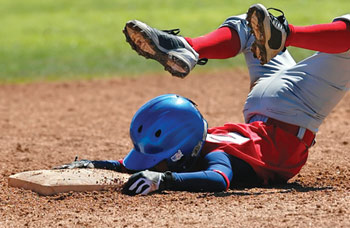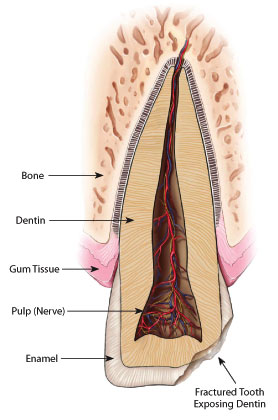Trauma & Nerve Damage to Teeth
The proper evaluation can make all the difference!

This article provides answers to common questions about the essence of what happens and what treatment is needed when injury to teeth involves the dental pulp. The dental pulp is the living tissue within the root canal(s) of teeth that contains blood vessels, nerves and connective tissues. Not only do the injuries and their treatment vary, but they are also influenced by the type of tooth, whether deciduous (primary or baby) teeth or permanent (adult) teeth, as well as their stage of growth and development. Treatment of dental pulp (nerve) injuries is called root canal or endodontic treatment.
What is endodontic treatment?

Endodontic treatment involves the root canal(s) inside of the tooth derived from “Endo” the Greek word for “inside” and “odont” is the Greek for “tooth.” To understand endodontic treatment, it helps to know something about the anatomy of the tooth. The body of a tooth is made of dentin with the crown covered by enamel, one of the hardest substances produced in nature. Inside the tooth, is a soft tissue called the pulp containing blood vessels, nerves and connective tissue, which creates the surrounding dentin and enamel during growth and development.
The pulp extends from the crown of the tooth to the tip of the roots where it connects to the tissues surrounding the root. Although the pulp is important during a tooth's growth and development, once it is fully mature the tooth can survive without the pulp.
Who performs endodontic treatment for injuries to children's and/or adult's teeth?
All dentists, including your general dentist, received training in endodontic treatment in dental school. General dentists can perform endodontic procedures along with other dental procedures, but often they refer patients needing endodontic treatment to endodontists. Pediatric dentists also receive training in the treatment of endodontic issues for primary (baby) teeth.
Endodontists are dentists with special training in endodontic procedures. They provide only endodontic services in their practices because they are specialists. To become specialists, they complete an additional two or more years of advanced training in endodontics after dental school. They perform routine as well as difficult and very complex endodontic procedures, including endodontic surgery. Endodontists are also experienced at finding the cause of oral and facial pain that has been difficult to diagnose.
How will my injury be treated?
Chipped teeth account for the majority of all dental injuries. Dislodged or knocked-out teeth are examples of less frequent, but more severe injuries. Treatment depends on the type, location and severity of each injury. Any dental injury involving the dental pulp of a tooth requires examination by a dentist, pediatric dentist or an endodontist immediately. Sometimes, neighboring teeth suffer an additional, unnoticed injury that will only be detected by a thorough dental exam that will include taking radiographs (x-ray pictures) of the teeth and surrounding bone structures.

Chipped or Fractured Teeth: Most chipped or fractured tooth crowns can be repaired either by reattaching the broken piece or by placing a tooth-colored filling or restoration. If a significant portion of the tooth crown is broken off, an artificial crown or “cap” may be needed to restore the tooth.
If the pulp is exposed or damaged after a crown fracture, root canal treatment may be needed. These injuries require special attention. If breathing through your mouth or drinking cold fluids is painful, bite on clean moist gauze or a cloth to help relieve symptoms until reaching your dentist's office. Never apply topical oral pain medications or ointments, or place an aspirin tablet directly to the injured or affected area in the attempt to eliminate pain symptoms, because they can further damage the pulp.
Injuries to the back teeth often include fractured cusps, cracked teeth and more seriously a split tooth or teeth. If cracks extend into the root(s), root canal treatment and a full coverage crown may be needed to restore function to the tooth. Split teeth (vertically fractured) may require extraction.




